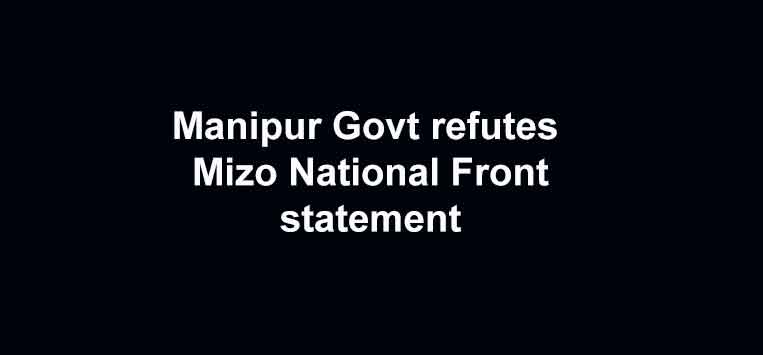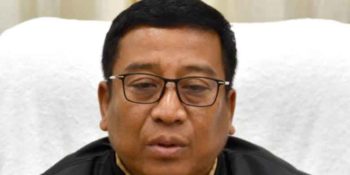Imphal: Manipur strongly has disapproved the ‘constant meddling in the internal affairs of Manipur by the Mizo National Front’.
The Mizoram-based political party, whose chief minister was routed in the last state Assembly elections, despite riding on a shrill wave of anti-national pro-Myanmar refugee propaganda and anti-Manipur stance, has come out with a press statement calling resignation of chief minister of Manipur.
A press statement was issued on Thursday in the name of VL. Krosehnehzova, general secretary, Media and Publicity department, Mizo National Front.
To refresh public memory, this political party has been consistently revealing its true colours as an anti-national party with its strong opposition to the efforts of the Indian Government to fence its open borders with neighbouring Myanmar for the purpose of curbing illegal immigration, trafficking of arms and drugs, internal security and defence, a Manipur government statement said.
Myanmar is the origin of most of the illegal immigration and drugs problems that Manipur has been facing. Going a little further back in history, the MNF had run a secessionist movement in the then Mizo district of Assam.
The ongoing crisis in Manipur is a creation of illegal immigrants from Myanmar, whose economy, after illegally settling in the state, driven by cultivation of illicit poppy, had taken a severe hit under chief minister N. Biren Singh’s War on Drugs, it added.
“It is not on account of any religious policy of the state government, as has been falsely portrayed by the MNF and other vested interests, even on foreign soil and in various international fora, through fabricated narratives. The Mizo National Front appears to have also conveniently forgotten that the conflict, on the Kuki side, is funded by narco-terrorist elements.”
In the period between 1969 till present, there has been an increase in number of villages in the districts of Kangpokpi, Tengnoupal, Chandel, Churachandpur and Pherzawl by 893, from 731 to 1624. In the remaining hill districts of Tamenglong, Noney, Senapati, Ukhrul and Kamjong, which are Naga-dominated, the increase during the same period is a figure of merely 49, up from 527 to 576, a mere 9% increase. Is the Mizo National Front aware of the reasons behind this abnormal 122% increase in mushrooming of villages, many of which are in forest areas, in the first group of hill districts, which are Kuki dominated, or which has a sizeable Kuki population? Manipur government asked.
The Mizo National Front is reminded that the Mizoram Government, in view of similar concerns of pressure on land, livelihoods and resources, had instructed Myanmar nationals not to purchase land and run business without prior permission from state government. In addition, the foreigners should also not enrol for Aadhaar, voter list or obtain driving license, amongst others. Why should the MNF oppose the decision of the Manipur Government to tackle the issue of illegal immigration similarly in Manipur? It added.
Mizoram has fixed a cut-off date in 1950 for defining Indigenous Persons and Non-Indigenous Persons for the purpose of implementing the Inner Line Permit system. The Manipur Government had likewise set out cut-off date in 1951 for similar purpose in the Manipur People Bill. Yet, in the book ‘the Indigenous Zomi’ co-authored by S. Khamzalian Ngaihte and K. Vungzamawi, the authors refer to the ‘Manipur Peoples Bill’ where the bill sets out 1951 as base year to qualify as ‘Manipur People’, it said.
The authors voice concern as follows: ‘if the act is to be implemented almost eighty percent of the tribal population in the hill areas will be excluded from’ qualification as ‘Manipur People’ and ‘will be treated as ‘Non-Manipur persons’ … ‘with disastrous consequences’. The Mizo National Front will do well to dwell on these lines and ponder over the scale of illegal immigration that has happened since 1951 as voiced by these authors from within the so-called Kuki-Zo community, instead of talking about discrimination by Manipur Government. Incidentally, the state of Manipur has fixed a cut-off date of 31st December, 1961 for the said purpose subsequently.
During the period from 2017 till date, the Manipur Government launched War on Drugs and seized or destroyed drugs worth Rs. 60,000 crores in the international market. This includes 304 kg of heroin powder, 3,775 kg of brown sugar, 1,804 kg of opium, 1,976 kg of WY tablets and 422 kg of SP tablets, ice crystal and pseudoephedrine. 16,787 acres of poppy cultivation were destroyed. There was a decline of 60% of acreage under illicit poppy cultivation between 2021 and 2023. On account of efforts of State Government and assistance of Central government agencies, the transit of drugs within the State of Manipur has come down to almost nil currently. On the other hand, Mizoram has now emerged as the favoured route for international transit of illegal arms, ammunition and drugs between India and Myanmar.
“The MNF should focus on the looming threat on Mizo society from the drugs trade instead of passing unwarranted comments on legally justified acts of the Government of Manipur to combat drugs trafficking. If requested by the MNF, the Government of Manipur will extend all assistance to the efforts of the state of Mizoram towards curbing drugs.”
The Biren Singh government has been making continuous efforts towards restoration of peace and normalcy. The government has been providing food, clothing and shelter to over 60,000 persons staying in relief camps across the state. Combing operations to recover arms and ammunition looted from police armouries continue to be undertaken with success. Law-breakers have been brought to book, from time to time. SITs constituted by Centre are supervising investigation of cases. Sensitive cases have been handed over to NIA and CBI to ensure impartial investigation. A Commission of Inquiry headed by a retired Supreme Court Judge is enquiring into the origins of the ethnic conflict, said the Manipur government statement.
Several efforts towards peace, including meeting of legislators convened have resulted in major developments with the Thadou community, the largest tribe in Manipur, and the Hmar tribe, expressing willingness to end the crisis, with the Meiteis and the Liangmai tribes reciprocating wholeheartedly, it added.
“We must be wary of the greater agenda of carving a Kuki-Chin nation out of contiguous areas of Myanmar, India and Bangladesh, played out over decades of meticulous planning, through illegal immigration, land grabbing, displacement of original indigenous peoples, formation of Kuki-Chin dominated districts, establishment of Autonomous District Councils, upgradation of such Councils to Scheduled Areas, amalgamation of Kuki-Chin areas and finally Nationhood.”
“The Government of Manipur will not allow fragmentation of North East India at the behest of foreign vested interests either in Manipur or in its neighbourhood. Any individual, group or organization working with such intent shall be met with the strong hands of the law.”











